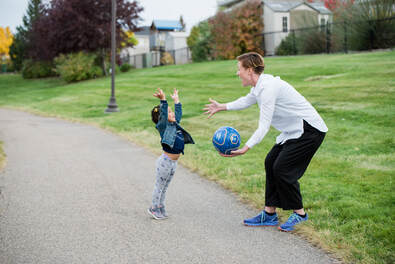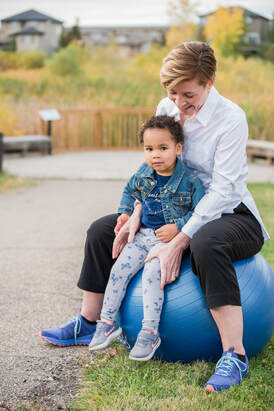Pediatrics
Specialized pediatric physiotherapy focuses on the development and movement of growing children from birth to adolescence. The therapist utilizes age-appropriate play and instruction to assess and treat conditions specific to children.
Conditions include:
Assessment
Assessment will begin with an interview with the parent to obtain a medical history and identify any areas of concern. Observation of your child playing and moving will proceed a formal full-body assessment. Outcome measures may be used with the consent of the family to direct care planning and track progress over time.
Skills such as sitting, crawling, running, balance, jumping, motor coordination, motor learning, strength and posture are evaluated. Muscle tone and neuromuscular systems are considered.
Treatment
Treatment will be tailored to your child and your family. The number of in-person therapy treatments recommended will vary by condition. Treatment may include the recommendation of home and daycare programs, supportive devices, and referrals to allied professionals.
What to expect
You are the expert on your child. Therapy is a collaborative process and programming is directed by how you can participate. Setting achievable and measurable goals to track change over time is key to seeing your child progress. Success is defined not only by the resolution of impairment but rather by your child's ability to participate in being active at home and in the community.
Booking you visit
Services may be in clinic, homes, community centers, or daycare depending on goals and mobility considerations. Children eligible for the ASD individualized funding program can utilize services with Jennifer.
Conditions include:
- Motor milestone delays
- Postural alignment - Scoliosis
- Lower body orthopedic alignment - hip dysplasia, in/out-toeing, toe walking, club foot, W sitting, scooting
- Congenital heart and lung conditions
- Traumatic conditions - broken bones, patella dislocation
- Head shape and neck tightness - plagiocephaly/torticollis
- Acquired conditions- cerebral palsy, spina bifida, muscular dystrophy, autism spectrum disorder, FASD, genetic syndromes.
Assessment
Assessment will begin with an interview with the parent to obtain a medical history and identify any areas of concern. Observation of your child playing and moving will proceed a formal full-body assessment. Outcome measures may be used with the consent of the family to direct care planning and track progress over time.
Skills such as sitting, crawling, running, balance, jumping, motor coordination, motor learning, strength and posture are evaluated. Muscle tone and neuromuscular systems are considered.
Treatment
Treatment will be tailored to your child and your family. The number of in-person therapy treatments recommended will vary by condition. Treatment may include the recommendation of home and daycare programs, supportive devices, and referrals to allied professionals.
What to expect
You are the expert on your child. Therapy is a collaborative process and programming is directed by how you can participate. Setting achievable and measurable goals to track change over time is key to seeing your child progress. Success is defined not only by the resolution of impairment but rather by your child's ability to participate in being active at home and in the community.
Booking you visit
Services may be in clinic, homes, community centers, or daycare depending on goals and mobility considerations. Children eligible for the ASD individualized funding program can utilize services with Jennifer.




